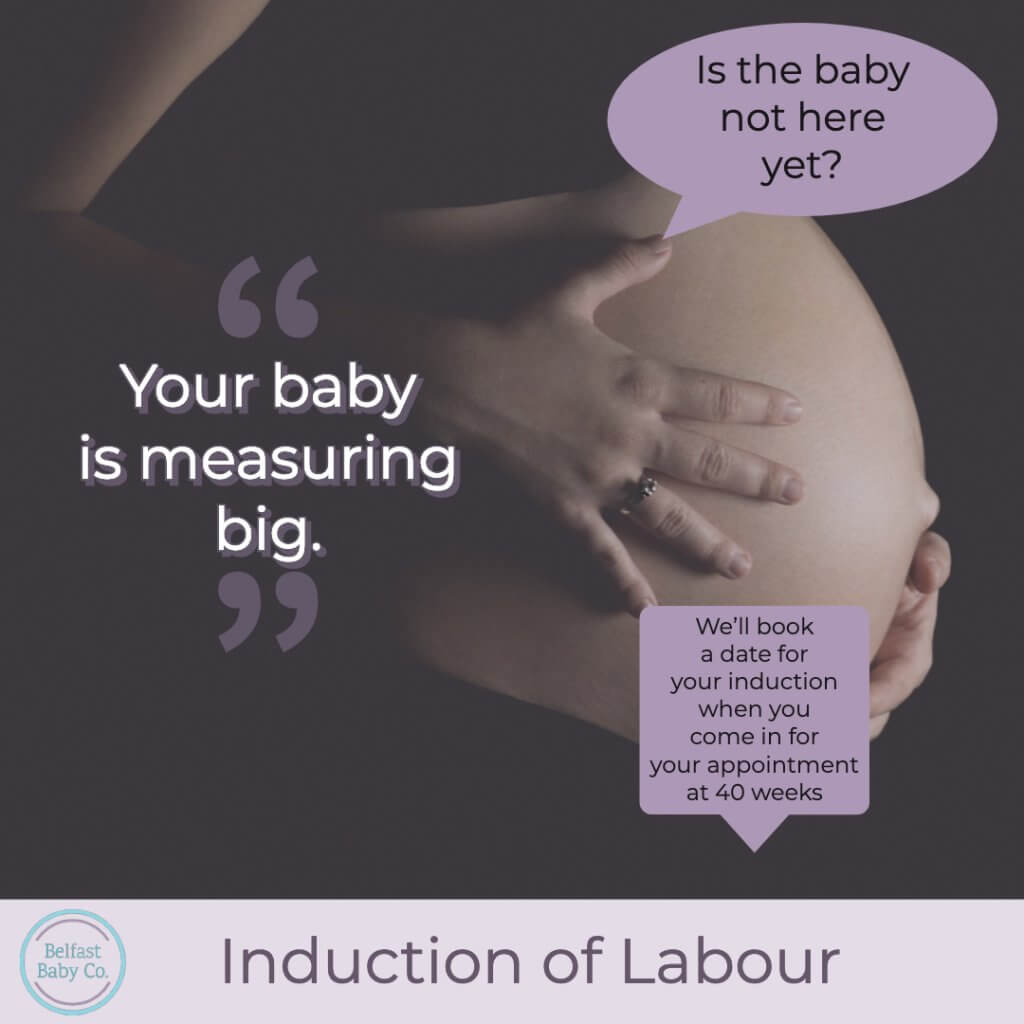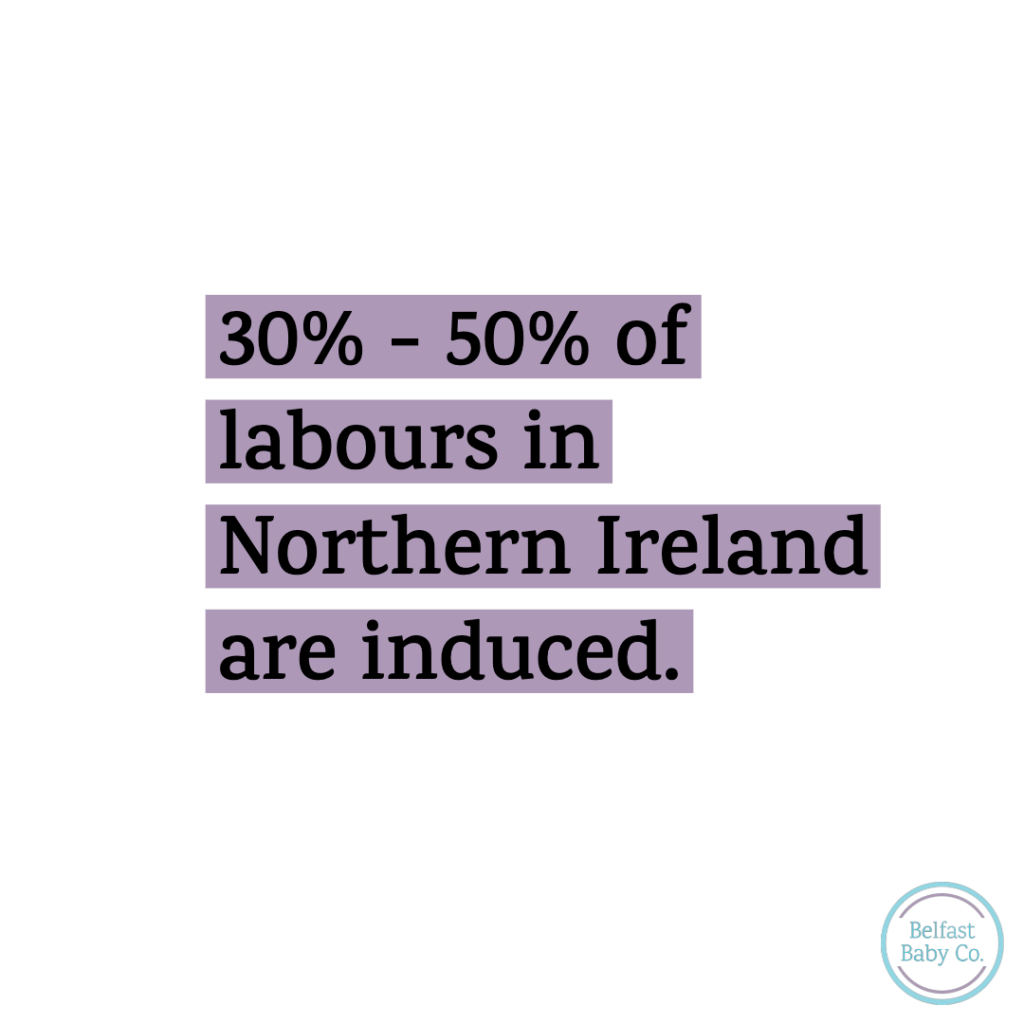
‘Is the baby not here yet?’ ‘Your baby is measuring big.’ ‘We’ll book a date for your induction when you come in for your appointment at 40 weeks.’ – induction of labour, do you really need it
Most babies are born between 38 – 42 weeks, with only about 5% actually born on their due date. And with menstrual cycles and ovulation days varying so much between women, it’s hard to pinpoint exactly when a baby is ready to make their entrance. But nearing your due date, when you’re tired, going to the toilet every half hour and feeling every ounce of that baby bump, how do you feel when the midwife suggests doing a ‘wee sweep’ then scheduling a date for induction?

Around a third of women in Northern Ireland have their labours induced, with rates at some hospitals at almost 50%. This really is much too high! Yes, there are medically indicated reasons to induce labour early, yet many women don’t realise that being induced is their choice.
- After 37 weeks, if your waters have gone, yet contractions haven’t started within 24 hours and you would prefer not to be induced, you can discuss a plan for you and your baby. For the majority of women, labour will start spontaneously within 48 hours.
- If you are post-dates and would prefer not to be induced, you can discuss additional scans and monitoring. Women are told that the risk of a stillbirth doubles, which is true, but what they aren’t told is that the risk is still very small at 0.4%.
- And macrosomia, or a big baby (ultrasound scans can indicate that a baby is measuring 10 pounds, yet they are born at 7.5 pounds, so needless to say it’s not an exact science) is not a reason for an induction unless there are other indications (NICE guidelines).
When labour begins spontaneously, the body has time to get used to the increasing intensity and frequency of contractions during the ‘how long is a piece of string’ first stage of labour. As you wait for things to properly get going, you can go about your day, you can rest or take a bath and usually you’ll be at home in familiar surroundings. Oxytocin, that magical hormone that orchestrates birth, also triggers the release of the body’s natural pain relief (endorphins), helping ease the discomfort. Inductions are started with either a prostaglandin pessary or a Foley’s catheter/balloon to soften the cervix; these don’t trigger the release of endorphins, so contractions of induced labour can come on very quickly and can be more intense (I’ve heard women describe it as feeling as if you have just been hit by a bus). You’ll be hanging about in the induction ward (where unfortunately the partners are sent home at 10pm) and there will be increased monitoring and/or vaginal exams (although, these are also your choice). This can mean that you might be less mobile, which can make labour more uncomfortable and increase the need for medical pain relief.

Once an induction is started, the clock is ticking. If the balloon or pessary hasn’t kicked off labour, it will be suggested to break your waters, quickly followed by a syntocinon drip, an IV supplying synthetic oxytocin (so again missing out on those vital endorphins and becoming even less mobile). All of this can lead to higher use of epidural and interventions such as ventouse or caesarean section. If your body and your baby are not ready for birth, whether that’s at 38 weeks or 42 weeks, induction is unlikely to work – something which is termed a ‘failed induction’. A horrible term that has a wonderful way of making the woman feel like it’s her fault, which it definitely is not!
Whether or not to be induced is your decision. Your midwife (or consultant) should discuss your options and fully support you no matter what decision you make. Ask questions, get all the information and go with what is right for you. And if your labour is induced, work with it. Be as mobile as possible by moving about or going for a walk. If you are being constantly monitored with a CTG machine, sit beside the bed and bounce on a ball. Make the environment your own, listen to music, ask your birth partner give you a massage, get oxytocin, that wonderful hormone of love flowing to help labour along. And if things don’t progress or plans change, make sure that you are fully informed of your options and are in control of your decisions. It is your birth and being induced does not mean that your birth cannot be the amazingly positive experience that every mother deserves!




